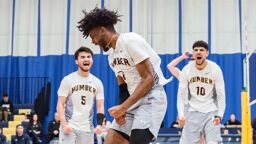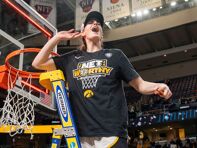When you see kids playing a ball game on a playground, there is one rule paramount to them — Be fair. Administer things as evenly as possible. Be kind and cool to each other. In the event of equal squawking, a do-over is just fine.
I’d like to believe that such thoughts were in their collective minds of administrators like Ivy League Executive Director Robin Harris when the conference affirmed that University of Pennsylvania swimmer Lia Thomas, a transgender woman student-athlete, is eligible to compete in the Ivy League swimming championships this week.
Thomas taking the blocks at Blodgett Pool at Harvard represents the fairness she is due from the conference, fairness she hasn’t been shown by many.
It was a decision some thought wasn’t coming from the Ivy League, or from the NCAA, which also affirmed that it would not immediately adopt USA Swimming’s new trans-athlete policy, all but assuring Thomas a spot at the NCAA Championships — a spot she earned months ago.
In allowing Thomas to compete, and chastising the NCAA for a midseason rules revision that put Thomas’ eligibility at risk, the Ivy League’s statement is loud. Yet the words and the actions came after weeks of relative public silence on the part of the League and the University of Pennsylvania, and amid continuous silence from the NCAA’s headquarters in Indianapolis.
Since Lia’s record-setting effort at the University of Akron Zippy Invitational in December, she has been a target of vicious, unfair assaults from certain media outlets. It would have mattered a lot if the conference, the school and the NCAA had spoken out that next week while outlets such as Fox News and OutKick were using her as a piñata.
The NCAA built their original transgender student-athlete inclusion policy in 2011. It was based around consensus with an eye towards gaining the most data possible at the time to make the best-possible decision.
R. Nick Gorton, a San Francisco-based physician, was part of the group that created that policy.
“I just told them this is what happens when you hormonally transition for this amount of time and how this can be monitored,” Gorton said on the Trans Sporter Room. “I gave them the scientific data. I gave them the trans information and the science while using their expertise as well.”
Also at the table were numerous advocates for trans inclusion in sports.

When it chose to abandon that policy last month, some feel the NCAA conceded to the false outrage of pundits like Tucker Carlson, and the legislators pedaling the Alliance Defending Freedom’s “cut-and-paste” anti-trans legislation.
Where’s the fairness in the immediate presumption that Thomas’ success is due to an “unfair advantage”?
For her part, Thomas has reportedly followed every rule put in front of her to be eligible to compete since moving forward with her transition in May 2019.
Where’s the fairness in her eligibility being called into question within weeks of a championship she has earned the right to compete in? Where’s the fairness in the immediate presumption that Thomas’ success is due to an “unfair advantage”?
The upcoming International Olympic Committee guidelines on transgender inclusion, a change the NCAA said they based their own policy revision on, frowns on that presumption.

The presumption leaves Thomas cast as the “villain” who is “stealing opportunities.” Phrases like that one, along with “fairness for women” and “protecting women’s sports”, are the slogans of many like Nancy Hogshead-Makar. The founder of the Women’s Sports Policy Working Group casts the effort she started in 2020 to create trans-athlete policy as a “middle ground” between perceived “extremes.”
Underneath the lofty goals are actual statements made, by three-time Olympic champion Hogshead-Makar and others. They say Thomas has not “mitigated enough” of the advantage they perceive the college student-athlete has through hormone replacement therapy. Their argument seems to echo that “unwritten rule” some have regarding trans women in sports: Transgender women can play as long as cisgender women always win.
Lia Thomas holds the nation’s leading times in two events, the 200-yard freestyle and 500-yard freestyle. Just behind her on the time chart for the 500-free is Brooke Forde, a young woman who brought home a silver medal from the Olympics in Tokyo last summer and who is slated to race against Thomas next month.
“I believe that treating people with respect and dignity is more important than any trophy or record will ever be, which is why I will not have a problem racing against Lia at NCAAs this year,” Forde said about this situation.
Forde could teach certain media outlets many things about respect and dignity.
It would be naive to think the transphobia of some people in this discussion will go away anytime soon. The unfair treatment Thomas has received in some quarters will be displayed the second another transgender woman does well in a sport.
For those who hold that level of transphobia, this isn’t about sports. It’s about transgender people existing at all.

As they work to craft a policy that centers inclusion of trans athletes, hopefully the NCAA will consider the example of the open letter they received from over 300 former and current collegiate and elite international competitors. If nothing else, the collection of those supporters are an example of what can happen when you don’t hesitate to speak out.
I hope the NCAA considers the growing research at hand today, and link it to what they did in 2011.
I would like to see stakeholders, advocates and experts at the table with a mindset toward inclusion: minds working together, learning together and building solid policy that protects every student-athlete.

Lia Thomas has been supported, she’s been scorned, but by rule and by merit she’s earned the chance to win or lose in the pool this week. The Ivy League chose to interrupt some of the scorn, putting the focus off the controversy and onto the competition.
In affirming her eligibility, the Ivy League listened to that inner child on the sandlot. They chose to be fair.







































